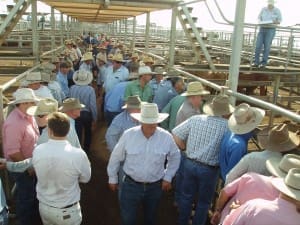Livestock agents in all states would require licenses to operate and would be compelled to report evidence they see of buyer collusion, if a recommendation put to Senators conducting an inquiry into the red meat sector gains support.
The Senate Rural and Regional Affairs and Transport References Committee is due to hand down the final report and recommendations from its inquiry into competition issues in the red meat processing sector in early May.
The inquiry has been seeking evidence of buyer collusion, and is considering strategies to reduce the potential for anti-competitive practices in future.
Beef Central understands that one recommendation that has been put to senators would see the introduction of a national training and licensing program for livestock agents and possibly also cattle buyers.
It is believed there is support for the move as a way to ensure uniform standards of professionalism across the national livestock agency industry, and also to compel livestock agents to report evidence of buyer collusion.
Livestock agents are at the front line of many livestock transactions, but at present there is little enticement to report any anti-competitive practices they may see.
If supported the recommendation would see agents threatened with the suspension or loss of their licence, if it is later found that they had seen but turned a blind eye to evidence of collusion in front of them.
This move is seen as dovetailing with the ramping up of the Australian Competition and Consumer Commission’s resourcing to investigate complaints of anti-competitive practices in agriculture, following the recent appointment of new ACCC ag commissioner Mick Keogh.
Will this recommendation solve competition issues or unfairly burden livestock agents by requiring them to take on an unpaid role as ‘policemen’ of saleyards?
Existing licenses are managed at State level, and different states have different licensing requirements.
A licence to auction livestock is required in Queensland, New South Wales, the Australian Capital Territory, Western Australia and the Northern Territory. NSW also requires agents to pass, as a minimum, a ‘certificate of registration course’ to sell livestock.
No livestock auctioneers licence is required in South Australia, Victoria and Tasmania.
A few years ago the Australian Livestock and Property Agents Association (ALPA) worked with the National Occupational Licensing Authority (NOLA) to try to develop a national licensing program for livestock agents and real estate agents (real estate licenses are also state based-licenses and not uniform nationally) through the Council of Australian Governments (COAG).
However the move was not supported by all State Governments. States with no existing licensing saw national licensing as more unnecessary red tape and an unfair imposition on their agents. Without uniform support the push for national licensing petered out about 18 months ago.
For its part, the peak body representing livestock agents, ALPA, sees merit in a uniform national licensing system.
It says the move would overcome the problem agents currently face in dealing with state idiosyncrasies when operating from one state to another. Some states require agents to hold three separate licenses to auction livestock, sell real estate and auction real estate, while other states only require agents to hold a licence to sell real estate.
ALPA CEO Andy Madigan predicts that if the Senate does recommend the introduction of national licensing of agents, the idea will continue to face stern resistance from those States that do not currently have licensing, which see it as unnecessary cost and imposition on their agents.
Nor was licensing of livestock agents going to prove anti-competitive activities, he said.
Proving that collusive practices were happening, and that agents knew they were happening, was very difficult, he said. There is speculation but no proof.
“In Queensland and NSW, where the majority of the cattle are, we’re not going to stop it if it in fact exists just because we have a licence,” Mr Madigan said.
“No one has ever been prosecuted for it that I know of, so how they are going to prosecute an agent and prove he knew about it?
“It would be a very hard thing to prove.”

